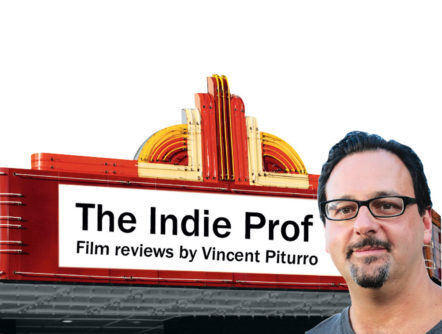
Each month, the Indie Prof reviews a current film in the theater and second film or series available on DVD or instant-streaming service. Follow “Indie Prof” on Facebook for updates about film events and more reviews.
July is Science Fiction month, and this year marks the start of the 8th annual Science Fiction Film Series. I host the series, in conjunction with the Museum of Nature and Science and the Denver Film Society. The goal is to join art and science, explore the intersections therein, separate fact from fiction, and to discuss the relevance of Science Fiction in contemporary society. Science Fiction is not all about aliens and outer space—much of the best recent Sci-Fi is set in the near future and tells us more about the current world rather than the future world. This month’s column looks at two different iterations of near-Sci-Fi, one a TV series and one a film featured in the Series. Find more information about the Series on the DMNS website or the Film Society website.
The Handmaid’s Tale (Hulu)

The Handmaid’s Tale
In my review of season one last year, I called this the best show on TV. It still is the best show on TV. I will accept arguments from the Game of Thrones camp and even from (the very underrated) Better Call Saul fans. But when you put together everything, including the writing, acting, cinematography, editing, and sound, you have a package of professional and artistic production that is unparalleled on TV. Season two is outstanding.
The show has now outlived the book by Margaret Atwood, and the scripts are original. Atwood herself has endorsed the project, and she is very enthusiastic about the direction. In a recent interview, she called season two a “call to action,” and has spoken out about the current political condition. At age 78, the wonderful author has remained hopeful about the future, and she believes the mere act of writing “is optimistic.” We should all have such a wonderful attitude.
As I noted last year, “the production values, acting, cinematography, editing, and sound rival the best of any cinematic venture. At times the camera is static and the frame is composed in a deep-focus that allows life to pass as we witness it realistically. The effect is chilling.” Again, the same holds for season two, and the show is now even better with sharper production values. The set design and detail in the frame is more intricate, and as the universe of the show expands, the artistic integrity of the story and the style are up to the task.
One of the biggest wins of season two is the character development; Elizabeth Moss is once again tone-perfect as June/Offred in the lead role (my prediction last year that she would have a busy awards season came true; she won both an Emmy and a Golden Globe last year) and Yvonne Strahovski as Serena Joy is still fantastic—this time in an expanded role. We come to know Serena in a different light, and we may (or may not) change our opinion of her. Either way, the show succeeds in making us rethink our alliances. It is a really a triumph on every level.
Seasons one and two are available on Hulu.
You will enjoy this series if you liked American Gods, Westworld, and/or 1984.
Annihilation (2018)

Annihilation
Writer/Director Alex Garland follows up his 2015 directorial debut Ex Machina with another sci-fi epic based on the book series of the same name by Jeff VanderMeer. The story is about a group of five women who enter something called “The Shimmer,” an environmental disaster/bubble that encompasses an ever-expanding, swampy area in the southeast U.S.—the source of which was an extraterrestrial meteor that landed in a lighthouse. The main character Lena (Natalie Portman), a biologist, is motivated to investigate The Shimmer after her husband was the only one to escape from the last expedition. She joins an eclectic group that includes a psychologist (the cold and calculating Jennifer Jason Leigh), a paramedic (Gina Rodriguez), and two other scientists (Tessa Thompson and Tuva Novotny). Each has their own motivation for the journey, and once they enter the shimmer, their lives (and the film) gets weird.
Once there, they experience time shifts, bizarre flora that seems to defy Earthly laws, attacks by mutated bears and alligators, and topiary in the forms of humans. And those aren’t even the weird parts. This is one of those films that defies simple explanations at points, focuses on the journey more than the destination, and is structurally complex, with a multitude of flashbacks that break continuous temporality and even include flashbacks-within-flashbacks.
If you’ve seen Ex Machina, you know that Garland’s style can be oblique and even a bit distant. It is reminiscent of Kubrick (2001: A Space Odyssey) and Tarkovsky (Solaris and Stalker), great directors who have defied simple analysis. That style is tempered here by the excellent characterizations and some of the dialogue that focuses on the thematic core of the film. This is a film that can benefit from discussion, so please join us at DMNS on Wednesday, August 1 for a screening and that discussion.
Available on all Video on Demand (VOD) outlets.
You will like this film if you enjoyed Ex Machina, 2001: A Space Odyssey, and/or Solaris.
*Vincent Piturro, Ph.D., is an associate professor of Cinema Studies at Metropolitan State University of Denver. He can be reached at vpiturro@msudenver.edu.




0 Comments